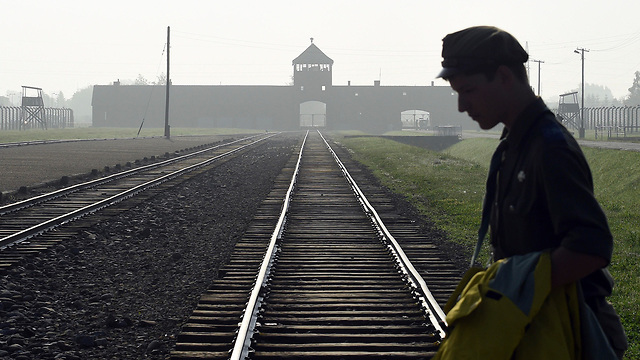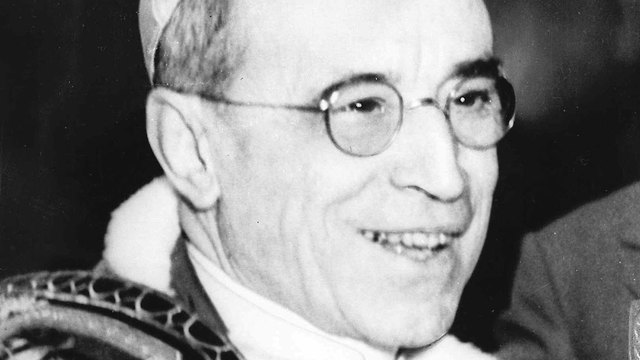

Opening the Vatican archives won’t absolve the Church
Opinion: The Vatican’s silence in the face of Nazi genocide is a proven fact; there were many local initiatives to rescue Jews that were blessed by Pope Pius XII, on a case by case basis, while he sought to maintain neutrality and protect churches. But the archives might shed light on the matter of Jewish children hidden in monasteries or with Christian families under the auspices of the Church.
Dr. Stephen D. Smith is a British Methodist Christian who visited Yad Vashem in 1993. He was 26 at the time, and the visit changed his life. The story of the Holocaust gave him no peace and with the support of his family, when he returned to his hometown of Nottinghamshire in northern England he established Beit Shalom, an educational and museum center for Holocaust education. With extraordinary talent and astonishing ambition, Smith quickly became the central authority in teaching the Holocaust in Britain.
During my years of working at Yad Vashem as the director of the International School for Holocaust Studies, I met with him many times and a personal and professional friendship developed between us. In the summer of 1999, I visited his home and the educational center he established nearby.
He told me then that he considered converting to Judaism in solidarity with the Jewish people and their suffering during the Holocaust — but decided not to do so because he believed that his unique contribution to Holocaust remembrance would be more significant as a Methodist Christian.
In that conversation I brought up a unique challenge. Pope John Paul II was to visit Yad Vashem on March 23, 2000, and ahead of the visit I suggested that we publish a book together on the subject of the Catholic Church and the Holocaust and Smith enlisted enthusiastically.
A team was formed including Prof. Carol Rittner, a Catholic nun and Stockton University (NJ) lecturer in the Department of Holocaust and Genocide Studies, and Irena Steinfeldt, who recently retired after a decade as director of the Righteous Among the Nations department at Yad Vashem. They met the challenge and the book did indeed come out on the eve of the Pope's visit.
The book devoted a chapter to the subject of Pope Pius XII and the Vatican during the Holocaust, consisting of five articles by Jewish and Catholic historians and intellectuals, including a priest and rabbi, who represented a wide range of viewpoints based on the documentation available to researchers at the time (the book was recently re-published by an American Catholic publisher).
Last week, we were informed of the Vatican's decision to publicize in a year's time all its archive documents from the Holocaust period — the term of Pius XII's papacy. The decision should indeed be welcomed, although it comes two generations late, but one should not expect any major drama in the research literature on the subject following the opening of the archives.
About a decade ago, an international scholarly workshop was held at Yad Vashem headed by historian Prof. David Bankier on the subject of Pius XII and the Holocaust. The presence of one researcher was especially prominent: Italian nun and Historian Grazia Loparco, who studied the documents sent from the Vatican to the monasteries and churches that sought to know the position of the Holy See regarding rescuing and concealing Jews. The picture that emerged at the end of her workshop taught us more or less the following:
A. The silence of the Holy See during the Holocaust is a proven fact and opening the archives will contribute nothing that denies this. When the Vatican was proposed to join the Allied Declaration of 17 December 1942 regarding the perpetration of the Holocaust, its scale, and the prosecution of war crimes criminals, the Pope decided not to join.
Instead, a few days later, on the eve of Christmas, Pius XII delivered a holiday sermon in which he spoke meekly about the suffering of human beings in war because of their ethnic origin. He did not mention Jews nor did he mention the Nazis.
B. There was no public initiative by the Holy See to save Jews; not by appealing to the Nazi authorities, not by calling on faithful Christians to save and hide Jews, nor in any other way.
It seems that the Pope sought to maintain neutrality in order to secure his ties with the Nazi regime and to protect the churches. It is important to note in this context that the Catholic Church in occupied Poland was severely persecuted by the Nazis who massacred many of its members. It is also known that when the head of the church in the Netherlands issued a protest, the Germans arrested converted Jews, including Edith Stein, and sent them to Auschwitz. Presumably this fact has bearing on the Pope's cautious stance.
C. There were certainly local initiatives by clergy, churches and monasteries that concealed Jews. Noteworthy in this context is the Archbishop of Toulouse, Jules-Géraud Saliège, who called on Christians to save Jews and was recognized by Yad Vashem as being a Righteous Among the Nations. As far as such cases were concerned, they did not stem from the guidance or encouragement of the Vatican. However, it seems that the more the Vatican was asked about this issue, the more it supported the rescue of Jews — not as a policy but as a direct answer to what was being asked.
D. In my opinion, there is one matter for which the opening of the archives does offer hope: in shedding light on the Jewish children who were hidden in monasteries or with Christian families under the auspices of the Church. If new material is uncovered on this matter, it will certainly be interesting to the public as well as from a human perspective.
In conclusion, when Professor Yehuda Bauer was asked if Pius XII could have prevented the Holocaust and how many Jews he was actually capable of saving, he replied: "I do not know how many Jews he could have saved, but he could have saved his own life."
Dr. Moti Shalem is Vice President of Content and Development at the Shem Olam Faith & the Holocaust Institute for Education, Documentation & Research















.jpg)


